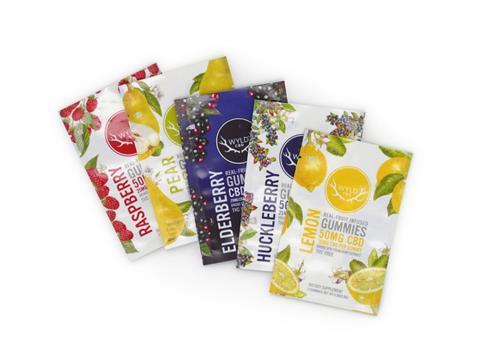
TIPA and Wyld are teaming up to package legal edibles in home-compostable laminate and take steps to keep hard-to-recyclable, single-use flexible plastics out of the environment.
In the United States alone, around 40 million tons of plastic waste is generated annually, yet only around 6% of it is recycled. With the legal edibles industry set to more than quadruple by 2032 at an estimated value of $37.1 billion, demand for sustainability-minded packaging is increasing amongst both consumers and businesses.
In response, Wyld is adopting TIPA’s 608 home-compostable laminate for its edibles packaging, as well as pouches and outer parcels. The laminate was recently brought to North America for local production and is set to package Wyld’s products across the US and Canada this year.
The two-ply laminate is said to offer high oxygen and moisture barrier to extend shelf life for a range of products. For legal edibles in particular, it reportedly aligns with state-dependent regulations with child-resistant seals and highly transparent and white consistencies in a range of thicknesses.
Because it is TÜV OK Home Compost certified, it can be placed in home composters at end-of-life; there it is said to break down into nutrient-rich soil and leave no waste behind. The laminate is also said to run on most conventional plastic packaging machinery.
TIPA anticipates that its work with Wyld will bring the company into a new market segment in line with its expansion for production in North America. Additionally, Wyld aims to phase out all petroleum-based plastic packaging in favour of compostables.
“This marks a significant milestone in both companies’ commitment to environmental responsibility and underscores our dedication to meeting the evolving demands of sustainability-conscious consumers,” says Rodrigo Castaneda, TIPA’s VP and GM North America. “This collaboration is poised to make a positive impact not only on the edibles industry but also on the larger movement to move away from traditional single-use flexible plastics for the benefit of our planet.”
Kale Gray, senior brand manager at Wyld, adds: “Wyld is excited to introduce this innovative, eco-friendly packaging solution to its product line, demonstrating a proactive approach to reducing plastic waste. By leveraging compostable materials, we aim to contribute to a greener future and set a new standard for sustainability within the edibles industry.”
In another push for enhanced sustainability in the cannabis sector, Terry Faulkner from Spark Sourcing upheld the company’s certified recyclable bio-calcium compound derived from eggshells, eco-shell, as a solution to combat plastic waste and carbon emissions.
Brandmydispo has implemented smart packaging features into its own cannabis packaging, including QR codes, real-time freshness indicators, and state-of-the-art near-field communication (NFC) technology.
A different development from TIPA saw the company work alongside ATI to create a ‘first-of-its-kind’ fully compostable lid for coffee capsules. The solution was designed to fall in line with upcoming compostability legislation and improve barrier protection, sealing properties, protection against material migration, and more.
If you liked this article, you might also enjoy:
The Lidl approach to packaging sustainability
How did Brazil achieve its 100% aluminium can recycling rate – and can it be replicated in the EU?
Experts have their say on the EU’s Packaging and Packaging Waste Directive revisions
A deep dive into the most important packaging sustainability trends and solutions

















No comments yet